| Srl | Item |
| 1 |
ID:
192573


|
|
|
| 2 |
ID:
192571
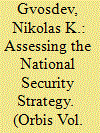

|
|
|
| 3 |
ID:
192574
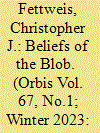

|
|
|
|
|
| Summary/Abstract |
The conventional wisdom of US foreign policy has at its core a set of widely held yet underexamined beliefs. Together, these notions constitute the essence of what has become tendentiously known as “the blob,” or the official mind of US national security. Debates and analyses can proceed more productively if foreign policy beliefs, rather than the people who hold them, are moved to the center of analysis. The blob is a mindset, not a group of individuals—one that is based on a few basic assumptions about the world and the United States’ place in it. This article describes what those beliefs are and how they influence US foreign policy.
|
|
|
|
|
|
|
|
|
|
|
|
|
|
|
|
| 4 |
ID:
192576
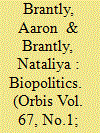

|
|
|
|
|
| Summary/Abstract |
COVID-19 and the subsequent global response have had a profound impact on the public health, economic health, and political health in nearly every country. This article examines the biopolitics of power and pandemics in war. Three case studies are presented: the Spanish influenza outbreak of 1918–1920 and responses to the COVID-19 outbreak in both Syria and in eastern Ukraine. The pandemic’s impact has been particularly acute in active warzones, undermining the ability of governments and organizations to enforce public health recommendations, provide for the care of patients, secure supplies, and transmit information.
|
|
|
|
|
|
|
|
|
|
|
|
|
|
|
|
| 5 |
ID:
192575


|
|
|
|
|
| Summary/Abstract |
Recent US security policy failures in Afghanistan and Iraq reflect a flawed National Security Council (NSC) process and capacity to identify and prioritize security interests and goals. Failure to recognize and adjust NSC analytical procedures is particularly problematic given growing security challenges, disturbing trends in America, and the fragile state of our Republic. President Joe Biden’s long-awaited national security strategy fails to correct this and is predictably flawed in the same fundamental ways as past NSC efforts. The document voices broad, aspirational goals describing what the administration wants to achieve, but is very ambiguous on the fundamental purpose of a strategy, describing how their goals will be achieved. Specifically, the document’s lofty yet ambiguous language articulates more policy than strategy, reemphasizing a fundamental NSC misunderstanding of strategy. This disconnect has direct implications to successful implementation. Ambiguous goals mean defining intent and formulation of supporting objectives are left to departmental and interagency interpretation. This invariably assures poor implementation towards disparate ends, and recently in abject failure.
|
|
|
|
|
|
|
|
|
|
|
|
|
|
|
|
| 6 |
ID:
192570
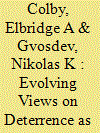

|
|
|
|
|
| Summary/Abstract |
Deterrence offers the United States not only a more effective security policy but also a more moral one than its alternatives—so contended Elbridge Colby in 2007. The author of the new book Strategy of Denial joined Orbis editor Nikolas Gvosdev to discuss how his perspective has changed over the last fifteen years. Excerpted and revised from an FPRI Zoom event in July 2022.
|
|
|
|
|
|
|
|
|
|
|
|
|
|
|
|
| 7 |
ID:
192577
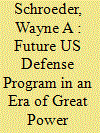

|
|
|
|
|
| Summary/Abstract |
The Great Power Competition requires a new defense posture that adapts to the exigencies of the Russia-Ukraine war and the rise of China. A successful defense posture will necessarily require a reexamination of US defense strategy, and, importantly, the level of resources devoted by the US and its allies to national defense. A defense real growth commitment should be initiated now and sustained for as long as this more competitive and threatening security environment remains in place
|
|
|
|
|
|
|
|
|
|
|
|
|
|
|
|
| 8 |
ID:
192578


|
|
|
|
|
| Summary/Abstract |
When Vladimir Putin invaded Ukraine last February, he seemed surprisingly confident that threatening nuclear escalation would inhibit any North Atlantic Treaty Organization (NATO) response. Despite Russia’s poor military performance, this coercive nuclear gambit seems to have paid off. Western countries preemptively ruled out direct intervention and have declined Ukraine combat aircraft and longer-range missiles as they openly agonize about how Putin could react if facing an outright military defeat. This seemingly successful use of nuclear brinkmanship raises the specter of the stability-instability paradox, a largely forgotten Cold War theory worrying that stable mutual nuclear deterrence could embolden military adventurism at lower levels of warfare
|
|
|
|
|
|
|
|
|
|
|
|
|
|
|
|
| 9 |
ID:
192579


|
|
|
|
|
| Summary/Abstract |
Both Federalists and Antifederalists agreed on the need to strengthen the Union against threats from without and disunion from within. The Federalists, nonetheless, spent much time defending the Union and attacking their opponents as disunionists. The Federalists won because they succeeded in shifting the issue from the questionable necessity of immediate and unamended ratification of their proposed reforms to the vital security necessity of continuation of the Union, on which their opponents in fact agreed.
|
|
|
|
|
|
|
|
|
|
|
|
|
|
|
|
| 10 |
ID:
192572
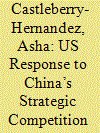

|
|
|
|
|
| Summary/Abstract |
The 2022 National Security Strategy (NSS) released by the Biden/Harris administration calls for the United States to “out-compete” China, to reintegrate the Middle East, and to refurbish US global leadership, in part by regenerating America’s technological and economic advantages that help to attract allies and partners. While these types of strategic documents are often seen as aspirational, when it comes to US policy in the Middle East and North Africa, the NSS reiterates what has already been the guiding directives for US policy in this region since 2021.
|
|
|
|
|
|
|
|
|
|
|
|
|
|
|
|